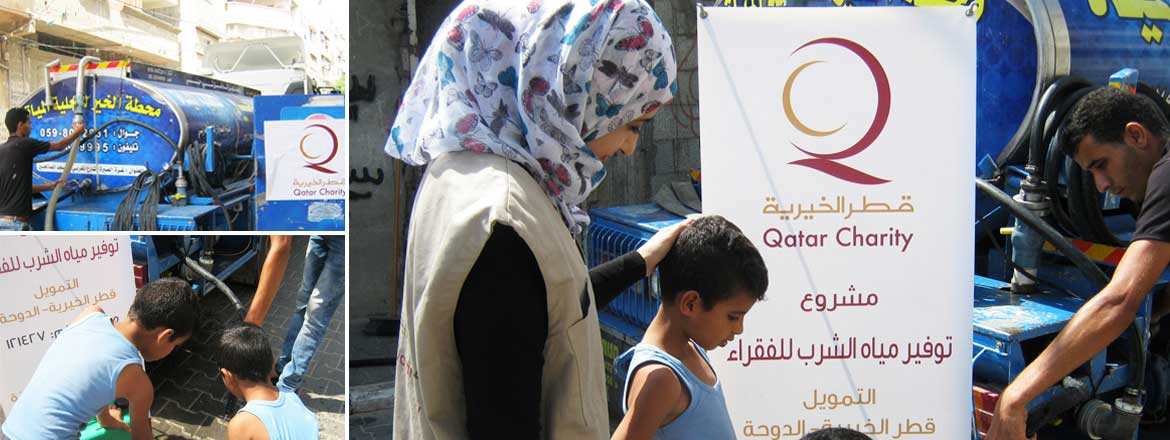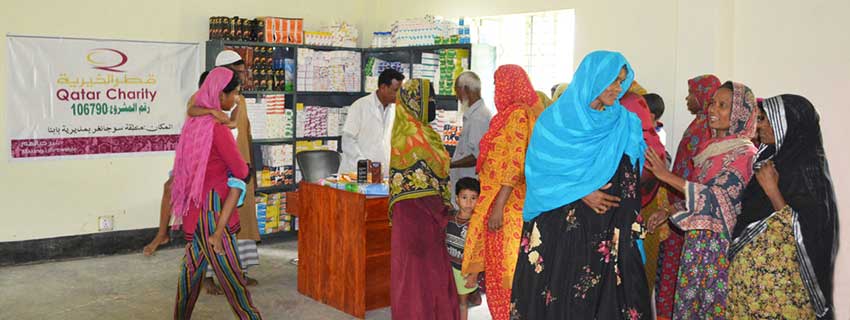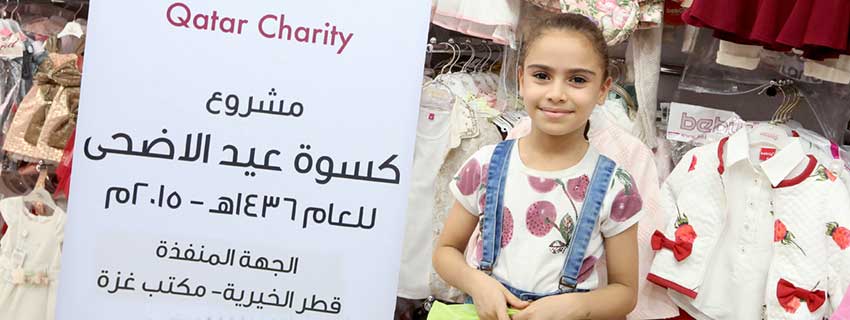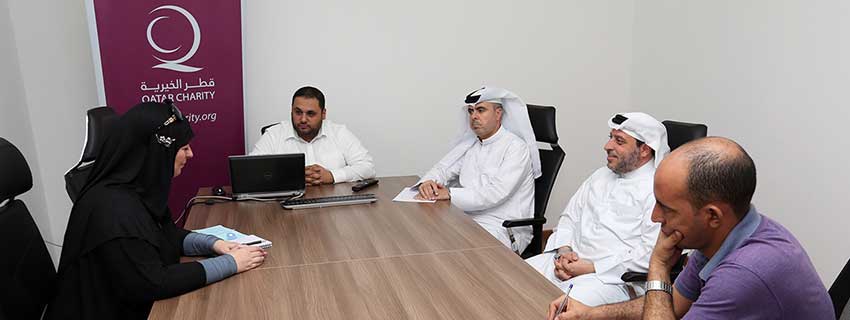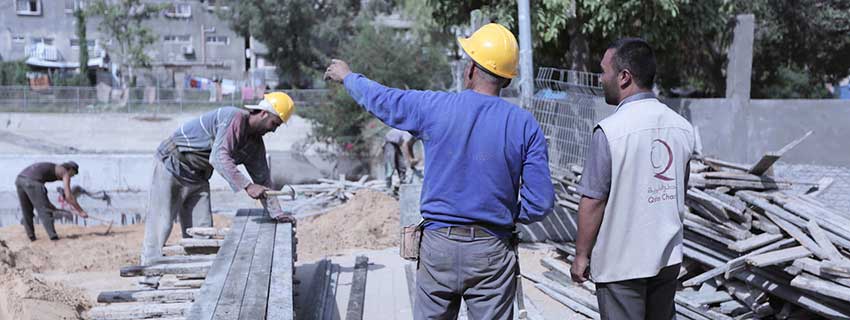QC Provides the Health Sector in Gaza Strip with Fuel
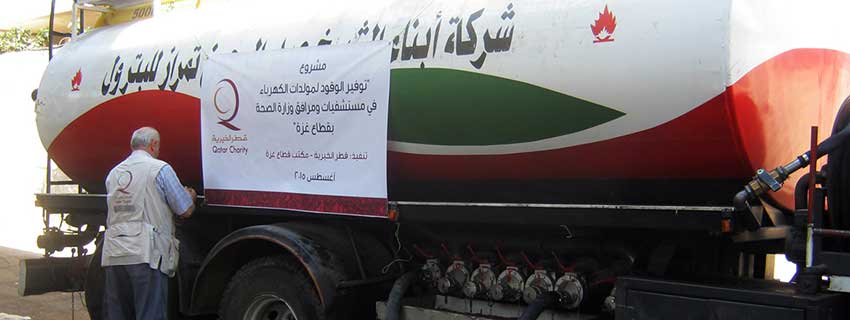
2015-10-26T01:19:12+01:00

The fuel QC provided the Ministry of Health (MOH) with will allow its 13 hospitals to operate perfectly fine. The hospitals have the capacity of 1,588 beds and can now continue to offer their services to the citizens.
QC provided the MOH with 200,000 liters of fuel to avoid a possible humanitarian disaster in the Gaza Strip’s hospitals. This project was implemented in order to compensate for the dire shortage in electricity which the ministry suffers from. QC provided fuel to operate the generators of the MOH’s facilities. This way the citizens can receive health services without any problems.
Saving the Day
This project, just like all of QC’s projects, is distinguished and important. The hospitals will not run out of fuel thus cause the health sector to fall apart. Now, instead, the hospitals can receive patients and offer them the needed services. Primary Care centers and the ambulances will benefit from this project. This will enable the medical staff to offer health services in the ICU, the OR, Renal Dialysis unit, the reception, the ER and the nursery.
Dr. Ashraf Abu Mahady, Director General of International Cooperation in the MOH, expressed his gratitude for QC’s quick response to the urgent appeal that the MOH had already made. “Our hospitals,” said Dr. Abu Mahady, “Are severely suffering because of the shortage in fuel. I thank QC for its support and help. 200,000 liters of fuel are definitely going to help the hospitals continue to offer medical services to the citizens.”
Eng. Mohammed Abu Haloub, QC’s Office Director in the Gaza Strip, said, “When the MOH in the Gaza Strip called for help, we, at QC, were so quick in responding because we know how important the health sector is. At a cost of 1,205,000QR, QC implemented this health project. The ministry suffers from continuous power cuts which could greatly affect the kind of services offered to the patients. More than 1,800,000 people depend on these hospitals.”
He then emphasized the fact that QC will always be there for the Palestinians who are under the Israeli siege. “We will provide the MOH with the necessary fuel to enable the hospitals to offer full medical services to the patients,” said he.
An Urgent Matter
The fact that the electricity is out more than 12 hours per day in the Gaza Strip means the health sector cannot offer any services to the patients. It is simply because hospitals cannot operate without electricity. There will be no working medical devices in the ER, no working nurseries, and no working devices for renal dialysis. This, of course, causes a huge threat to the hospitals if they run out of fuel.
90% of the health services offered in the Strip are by the MOH’s hospitals. They provide medical services to more than 1,800,000 people. Such services include surgeries, and intensive care. Some hospitals are even specialized in offering renal dialysis and nurseries. The MOH also offers primary care services through 56 care centers. They include treatment for chronic diseases, contagious diseases, and preventive healthcare.
It is necessary for the hospitals to use generators (i.e. around 360,000 liters of fuel monthly) to cover for the daily 12-hour power cut at a cost of 530,000 USD or else the health sector will not be able to offer any services to the patients.
Supply of Medicines
It is worth mentioning that QC had already implemented several projects for the benefit of the health sector in Gaza. Some of these projects are related to the supply of medicines as part of an intervention program designed specially to help those who were injured in the last attack on Gaza (summer 2014). In addition, the engineering plan for building the internal medicine hospital as part of Al Shifa’ Medical Complex in Gaza at a cost of 582,000 QR.
Furthermore, QC is working on different projects to equip the hospitals with electromechanical devices, including providing generators, replacing elevators, and rehabilitating the sterilization system and offering mechanical ventilation at a cost of more than 10,000,000 QR. The health sector in the Gaza strip is the most siege-affected. It suffers from shortages in resources and potentials.
You can donate to support such projects through the link: Click here
Related News
QC Implements ‘Providing Drink
Through its office in the Strip and in cooperation with Ghaith for Relief and Development, QC has recently started implementing ‘Providing Drinking Water’ project to the poor. More than 3,000 poor families are expected to benefit from it. It will take around 8 months for the project to be implemented at a cost of 262,000 QR.
Kidney Diseases
The Municipalities in the Strip provide the citizens with salty water only, which could cause many different diseases such as kidney diseases. Therefore, QC decided to implement this project in order to provide the poor families with good drinking water.
Eng. Mohammed Abu Halloub, QC’s Office Director in the Strip, said that this project is being implemented because QC wants to alleviate the sufferings of those who cannot afford to get good drinking water, and to prevent the diseases spread because of water pollution. He also emphasized the fact that water projects are on the top QC’s priorities’ list since the siege and the attacks on the Strip have destroyed all of the water networks, which were not even sufficient.
QC, as he also mentioned, will not spare an effort until it has helped the needy families and offered a good living opportunities for the needy; whether through relief or development projects.
Water Crisis
The Strip’s aquifer is both polluted and empty which made the Strip suffer from a dire water crisis. As a result, the Gazan families who are financially stable buy filtered water, while the poor families still use the brackish water provided by the municipalities.
To help face this crisis, QC is implementing a project to filter rainwater and to inject it into the aquifer in around 30 public schools.
The UN had already warned from the worsening situation of water in the Strip. According to the UN’s report, if the current conditions remain the same, the situation in 2016 will be catastrophic. The Strip is in great need for desalination plants a hundred times more than roads.
Reconstruction of Gaza
After all the destruction and wreckage the last aggression on the Strip caused, QC spared no effort to help rebuild the Strip.
More than 2,000 people were martyred during the aggression, 11,200 were injured, and thousands of families, whose houses were demolished, were displaced. Furthermore, many infrastructure facilities such as roads, hospitals, schools, and factories were destroyed.
The last brutal attack on the Gaza Strip caused the loss of so many people, houses, and facilities. 2,139 were martyred: 579 of them were children, 264 of them were women, and 102 were elders. 11,200 people were injured: 25% of them became handicapped. 1,000 children became permanently disabled. 2,088 women, 3,374 children and 410 old people were injured. 1,200 families lost their breadwinners. 90 families were entirely eliminated and 49 massacres were executed.
In addition, 466,000 citizens were displaced, 2,360 houses were completely destroyed, 13,644 houses were partly destroyed, 30,000 workers lost their jobs, and 134 factories were completely demolished. The destruction of Gaza cost a financial loss of 3,500,000,000 USD.
You can donate to support such projects through the link: Click here
QC Opens 13 Healthcare Centers
QC has recently opened 13 healthcare centers in different places in Bangladesh from which 500,000 people benefited at a cost of 1,000,000 QR.
QC made sure that the targeted beneficiaries are the neediest. Therefore, QC implemented the projects in the poorest districts which are Pabna, Kishoreganj , Gazipur, Naogaon, Madaripur, Barguna, Gaibandha, and Barisal.
Comprehensive Services
As part of the project, QC supplied these centers and the outpatient clinic with drugs and medical items. It also covered routine medical examinations. QC runs these projects either directly, or through its cooperation with local committees in order to sufficiently offer the basic services of medical care.
For this occasion, Mr. Mohammed Amine Hafith, QC’s Office Director in Bangladesh, said that QC implemented these projects out of its endless efforts to support the health sector in Bangladesh for its importance in the developmental process. QC tries to offer comprehensive services to the needy people of Bangladesh who live in rural areas where poverty and literacy are found. Thus, QC’s projects targeted these areas.
“These projects,” as he said, “will save the lives of so many people living there; especially chronic patients, women and children. They are the first victims of the lack of medical services. They are who need to cross long distances in order to be treated.” He then concluded his speech with, “QC will continue to exert efforts, it will continue to help and implement charitable and humanitarian projects. This is QC’s message and responsibility towards the poor, the needy, and the unfortunate.”
A Hospital & a Medical Center
Under its belief of the importance of the health sector, QC has recently implemented a medical project related to the Qatari Hospital and Medical center at a cost of 560,000 QR. It offers medical services to 100,000 people. It covers all kinds of treatments including outpatient and inpatient clinics, medical tests, radiology, and drugs. QC also offers training for the nurses, laboratory and radiology technicians, and pharmacist assistants. Doctors and specialists usually refuse to go to these distant places, which is why this training is very important. It helps prepare a qualified medical staff which can offer the patients the needed services. The inhabitants of these areas turn to warlocks who tend to deceive the families and trick them. They make use of the patients’ willingness to cling to any thread of hope, and make them believe that magic can heal them. With QC’s help, however, the trained staff will offer all the services these patients need at a low cost. This way, they will protect the people from imposters, risks, and health complications.
Ongoing Development
Bangladesh is universally ranked as one of the most overpopulated areas. It has a population of 170,000,000 people; 1,100 persons per km. The universally acknowledged rate is around 44 persons per km. Furthermore, it lacks the resources and depends mainly on the agriculture sector. It is, thus, one of the poorest and neediest countries. Its orphans, widows and unprivileged – especially those living in distant areas – need basic services; this is what QC tries to cover.
QC believes in its role in helping any person or place in need. It makes sure to implement qualitative and useful projects, to increase the number of beneficiaries, to fulfill its role in the social developmental process, and to positively affect people’s lives. As a result and after considering Bangladesh’s conditions, QC is doing its best to fulfill its part in the ongoing developmental process. It is doing so through helping increase production, raise the standards of living, and enhance the income of the neediest
You can donate to support such projects through the link: Click here
QC Implements ‘Kiswit Eid’ (Ei
- QC focused on the countries suffering from exceptional circumstance such as Palestine, Syria and Yemen
- El Kuwairi, “‘Kiswit Eid’ project aims at making the orphans happy, especially that it’s Eid”.
In 33 different countries, 1,750 orphans enjoyed the Eid and became more hopeful for a better future thanks to Rofaqa initiative, one of QC’s initiatives.
This project is one of so many others which QC works hard to implement so as to bring joy and happiness to the hearts of its sponsored children in Eid Al Adha.
Love & Care
Countries which suffer from exceptional circumstances were focused on such as Palestine, Syria and Yemen. These countries’ orphans need all the love and care one can possibly offer. They suffer every single day that any ray of hope could be very useful to them.
However, QC did not forget about the orphans elsewhere. It’s project was implemented in India, Jordan, Philippine, Bangladesh, Lebanon, Iraq, Pakistan, Sri Lanka, Nepal, Indonesia, the Comoros, Kyrgyzstan, Ethiopia, Nigeria, Mauritania, Kenya, Morocco, Chat, Mali, Benin, Burkina Faso, Senegal, Ghana, Togo, Niger, Bosnia, Albania, Kosovo, Sudan and Tunisia.
‘Eid Clothing’ campaign covered the orphans’ different needs. It included getting them shoes, and presents (based on their age and gender): shirts and pants for the boys, and dresses and shoes for the girls. More than 550 orphans benefited from the project.
Values of Mercy
Mr. Youssif Bin Ahmed Al Kuwairi, QC’s CEO, said, “We, at QC, made sure to prioritize the orphans, and pay extra attention to them. QC does its best to provide them with the necessary care they need. Plus, we all know that the reward our religion promises to those who sponsor orphans is great.”
He, then, added, “‘Eid Clothing’ initiative is only a means to compensate for their loss. Yes, it is not like parental love and care; however, QC works hard to make the orphans feel like they’re a part of something, a family. We know how important it is to stand by these orphans’ side; which is why supporting them is a priority.”
Through its ‘Rofaqa’ initiative, QC inaugurated ‘Eid Clothing’ campaign for the benefit of its sponsored orphans. The number of sponsored orphans from 31st of December 2013 until today reached 39,057 orphans from 35 different countries the world over.
Similar Projects
At the same time QC implemented ‘Eid Clothing’ project, it implemented ‘Your Sacrifice, their Eid’ campaign. Through this campaign, QC was able to provide 28,100 sacrifices (of bulls and sheep) in 54 countries in Asia, Africa, and Europe at a cost of 13,560,000) QR.
As for the Hajj season, QC implemented many projects which included ‘Substitute Hajj’, ‘Feeding Pilgrims’ and ‘Grouping Pilgrims’. Thanks to QC, 1,500 pilgrims performed substitute hajj at a cost of 5,700,000 QR. It also grouped 16 pilgrims at a cost of 152,000 QR and provided 25,000 meals for the pilgrims.
Comprehensive Care:
QC sponsors around 80,000 orphans from 35 countries. It offers them comprehensive care which includes education, health, shelter and other basics.
‘Rofaqa’ Initiative is a unique humanitarian initiative which is interested in helping orphans worldwide. It aims at reaching a complementary level of care for children and orphans. It wishes to offer a new vision based on comprehensive care to include social, educational, health and psychological aspects. ‘Rofaqa’ initiative, which was inaugurated in December 2013, was able to sponsor 39,057 orphans so far.
You can donate to support such projects through the link: Click here
QC Hosts the British Activist
Ms. Booth: “I chose QC because I already knew its excellent work in the field of charity in general and for the Palestinians in particular.”
After receiving an invitation from QC, Ms. Lauren Booth, a journalist and British activist, visited QC in Doha so as to work together to support the Palestinian families which suffer from poverty and the siege.
Ms. Booth is considered to be one of the most famous pro-Arab activists who helped break the siege which was imposed by the occupation on the Gaza Strip. She is currently dedicating her life and efforts to guarantee a better life for the Palestinians.
Poverty and Unemployment
Through its one-week visit to QC, Ms. Booth sought to cooperate with QC to help the affected Palestinian families, and to implement economic and social projects for the victims of poverty, unemployment, Israeli attacks and the siege.
During her visit, Ms. Booth met a number of QC’s officials who, together, discussed the sufferings of the Palestinians; especially those living in the Gaza Strip. They also discussed their need for aids and relief campaigns because of the horrible situation they’re living in.
Many QC projects were displayed during the meetings to show the important role of these developmental and relief projects in stabilizing the Palestinian families’ circumstances. Some income-generating projects implemented by QC in Palestine were displayed such as providing dairy cows, sheep, poultry, means of transportation, and others.
These projects helped provide a fixed income for hundreds of Palestinian families, and helped create many job opportunities for the unemployed. In addition, it changed so many families to become productive. As a result, the number of beneficiaries increased.
Ms. Booth’s visit included attending a number of activities such as participating in an event with the Qatari Business Women Association in cooperation with the Youth for Jerusalem Association, the women’s department; attending a lecture at a Holy Quran memorization center; and visiting some senior figures.
Alleviate the Suffering
Ms. Lauren Booth expressed her happiness for visiting QC and knowing about its different humanitarian projects in Palestine. “After having lived with the Palestinians, I understood exactly how much they suffer and how much help and support they need. Their circumstances are getting worse day by day because of the occupation and the siege. I chose QC because I know about its excellent work in the field of charity in general and for the Palestinians in particular. QC’s projects in Gaza are very important in providing a living for the people there,” said she.
She also spoke about how when she first went to Palestine, she was surprised to see the amount of suffering the Palestinians were going through, and it was that which made her exert all the efforts she could to help alleviate their sufferings.
“QC’s projects in Palestine are distinguished, and I hope these projects increase in number. I know how generous the Qatari people are; especially when it’s about their brothers and sisters from other countries. These projects, definitely, help the Palestinians and help fight poverty and unemployment,” said Ms. Booth.
A Better Life
It is worth mentioning that QC was recently able to implement thousands of income-generating projects in Palestine which helped thousands of families have a better life. The beneficiaries included widows, orphans, breadwinners, poor people, the unemployed and other needy categories.
QC had also inaugurated ‘We Build Palestine’ campaign to contribute in the development of the Palestinian people inside and outside Palestine as part of ‘Hand in Hand We Build Palestine’ campaign. This campaign finances and implements huge development projects at a cost of 197,826,000QR. It is expected that 1,147,000 people will benefit.
QC’s projects target all of the Palestinians in Jerusalem, the Gaza Strip, the West Bank, and the Palestinian refugees in the refugees’ camps of Lebanon and Jordan.
‘Hand in Hand We Build Palestine’ campaign was first inaugurated as a relief response to the circumstances facing the Palestinians in general and the people living in the Gaza strip in particular; taking into consideration the destruction the last Israeli attack caused. More than 2,000 people were martyred and 11,200 were injured, and thousands of families were displaced and their homes were destroyed.
Qatar Charitable is purifying
- The project includes purification of the rains water in 35 schools and friendship garden in a cost amounts to 6 million QR.
- International studies warn of sever up-coming problem in the drinking water in Gaza because of the polluted water aquifers.
More than 6 million QR is the cost of purifying the rains water project that Qatar Charitable continues to implement in Gaza Strip for the interest of tens of schools and Governmental buildings.
Water Problem
This quality project comes within the context of improving the infrastructure in order to benefit from the waste of rains water quantities, as they will be purified and injected into the water aquifers, and alleviate the damages caused by the rains water at the public streets and roads.
The project has been funded through the Gulf Cooperation Council of Gaza Strip Reconstruction in cooperation with the Islamic Development Bank in Jeddah, and implemented by Qatar Charitable in cooperation with Gaza Municipality, and in a cost that amounted to 6,022,000 million QR.
Job Opportunities
The engineer Mohammad Abu Haloub, Office Director of Qatar Charitable in Gaza has clarified that this project has included purification of rains water in 35 Governmental schools in different places of Gaza Strip, where a system has been set to include collecting the rains water from buildings, schools premises , playgrounds ,and squares, in order to collect them in the target schools and change them to water wells inside the schools with what this process requires from water lines and connections. Engineer Abu Haloub has indicated that work is still going on in order to develop purification capacity of the Friendship garden through setting purification systems through which rains water could be collected and injected into absorbing purification holes with what this process requires from equipment, means, and mate QR that help in water injection processes.
Abu Haloub has confirmed that among the objectives is the objective of reviving the Private Sector, and making job opportunities available through implementing the project, making it clear that this project is one of tens of projects that Qatar Charitable is implementing for the purpose of improving the infrastructure and reconstruction for many basic sectors in Gaza Strip, either for rehabilitating and/or reconstructing of demolished homes and houses of the poor, or for rehabilitating hospitals, agricultural sector and its branches, education sector, in addition to custody of orphans and handicapped.
Increasing the Storing Capacity
From his side, the Director General of Engineering and Planning in Gaza Municipality Mr. Nehad AlMughanni thanked Qatar Charitable for its efforts to alleviate the water problem and to work on the process of getting benefit from the rains water, extending his gratitude for Qatar Charitable for its constant support for different sectors in Gaza.
Al Mughanni has indicated that the project includes digging 300 cylindrical draining known in English language as (Piles) in the land of Friendship garden with a depth that amounts to 20 meters, then filling them with gravel and strewing a layer of gravel on all the tubs ,followed by a purifying layer,,, then a last layer of sand to purify the water, clarifying that the garden storing capacity is expected to increase soon after implementing the project to the amount of about 70.000 square meters of rains water per day.
Mr. Al Mughanni has also expressed gratitude for this comprehensive project that includes extending a drainage line to discharge the rains water from the crossroad of Jafa and Al Dorra streets to the garden, in order to solve the problem of the stagnant water in the crossroad, in addition to maintaining the garden and its premises, installing children toys, and establishing a new firm wall, as well as cleaning the water channels that lead to the garden. Yet, the project is facing a big challenge represented in the difficulty to bring in the raw mate QR to complete the project, because of the siege and closing the Israeli checkpoint now and then.
Water Pollution
It may be of importance to indicate that Gaza Strip suffers from a severe problem in the drinking water, because of the polluted water aquifers, where local and international studies have previously warned of the danger of pollution that infected the water in the Strip, the issue that hinders the choice of staying at this small size geographical spot, whose number of population exceeds 1.8 million people.
Qatar Charitable is endeavoring to contribute in providing solutions for some problems from which Gaza Strip suffers at many different sectors ,environmental, agricultural, health, education,, construction, as well as support of the poor and needy people.
Before sometime, Qatar Charitable has also, within the context of water problems implemented a project of providing drinking water for the poor, from which more than 3000 poor Gazan families have benefited.
In the same context, the United Nations have also warned within a report made about the issue from the danger of water status in Gaza Strip, where the report said that the Year 2016 will be a catastrophe if the current status continues as it is, indicating that the Strip is in a bad need to more saline water desalination stations, more than its need for roads a hundred times, as it literally described.
You can donate to support such projects through the link: Click here
